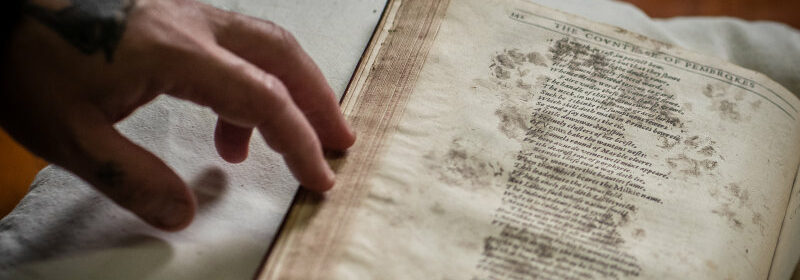Cat ruins master’s 17th century book with inky paw prints

Anyone who has ever owned cats can confirm how maddening they can be at times, but now we have historic proof that their occasional bloody mindedness stretches back centuries: the State Library Victoria has uncovered a rare volume from the 17th century defaced by a mass of cat paw prints.
The original owner of the 1605 bound volume of Philip Sidney’s The Countess of Pembroke’s Arcadia, a long prose pastoral romance, is lost to history. And so is the motivation of the book lover’s cat, and whether it was acting out of attention-seeking, insouciance or sheer malevolence.
A 1605 edition of Philip Sidney’s The Countess of Pembroke’s Arcadia, defaced by a 17th century cat, which walked all over it.Credit:Scott McNaughton
The rare book was donated several years ago to the library as part of the Emmerson collection, one of the world’s largest collections of rare English printed works.
Subsequently, librarians discovered that page 142 of the book was defaced by a muddle of inky paw prints.
“You don’t just grab this from Readings. This would be quite expensive, so it would be a wealthy person who owned this book,” said Daniel Wee, senior librarian history of the book and arts.
“Obviously they have walked away and the cat has spilt some ink and then walked over the book. It has not just walked across it, it’s almost pointed – as if it has sat there for a time doing its thing.”
The volume forms a centrepiece of the library’s World of the Book exhibition, which opens on Saturday (April 1).
A mammal curator from Museums Victoria confirmed that the paw prints belonged to a domestic cat. Tests will seek to determine when the cat made its “special contribution to history”, as the library put it.
Wee confirmed that the defacement altered the historic worth of the volume. “It will add a little bit of value,” he said.
World of the Book highlights the library’s collection of rare books and includes noted works by women authors purchased via a special Women Writers Fund to address the gender imbalance in the collection.
The first illustrated edition of Mary Shelley’s Frankenstein, part of the World of the Book exhibition at the State Library of Victoria.Credit:Scott McNaughton
This includes the first illustrated edition of Mary Shelley’s masterpiece, Frankenstein; or, The Modern Prometheus (1832), which has a frontispiece depicting the book’s famous monster not in its hideous Hollywood guise but as a well-built gentleman.
The volume is the first edition to contain a preface that recounts the famous story of the novel’s inception: a challenge with Lord Byron to some up with a story, on the shores of Lake Geneva.
Also on display for the first time is mathematician and natural philosopher Émilie du Châtelet’s French translation of Isaac Newton’s 1687 work, Philosophiæ Naturalis Principia Mathematica.
A leading figure of the French Enlightenment, du Châtelet not only translated Newton’s work, but also tested and proved his theories and wrote her own work Institutions de Physique (1740).
State Library exhibition curator Daniel Wee.Credit:Scott McNaughton
The free exhibition includes 340 items, including a digital experience, allowing visitors to virtually handle a rare 17th century book with stunning embroidered bindings that doomed English monarch Charles I gave to his bride French princess Henrietta Maria.
Other highlights include a first edition of Joan Lindsay’s Picnic at Hanging Rock in bright 1960s design, a feature display of the Moomins children’s characters and books that can’t be opened or read.
The exhibition has run annually since 2005 and attracts about 500,000 visitors each year, which the library says makes it the longest running and most popular book exhibition in Australia. It runs until early 2024.
The Booklist is a weekly newsletter for book lovers from books editor Jason Steger. Get it delivered every Friday.
Most Viewed in National
From our partners
Source: Read Full Article


